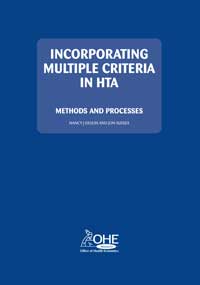Sign up to our newsletter Subscribe
Challenges and Solutions for Budget Impact Analysis of Gene Therapies

Sign up to our newsletter Subscribe

This OHE publication is intended to inform and stimulate debate about the way different sorts of evidence and considerations are taken into account in decisions about new health care technologies. The authors argue for greater use of multiple criteria decision…

This OHE publication is intended to inform and stimulate debate about the way different sorts of evidence and considerations are taken into account in decisions about new health care technologies. The authors argue for greater use of multiple criteria decision analysis (MCDA) as an aid to decision-making that is based on health technology assessment.

What a health care system should pay for depends, of course, on the health gain that results. Health technology assessment (HTA) and cost-effectiveness analysis have become the core for many such decisions — by NICE in the UK and by similar bodies elsewhere. Other factors, however, also are taken into account by the governments and insurers that fund health care. These typically include: the impact of decisions on social equity; the quality of the patient experience; ramifications for the wider economy; and the quality of evidence required for decision making. The purpose of this OHE monograph is to inform and stimulate debate about the way different sorts of evidence and considerations are taken into account in decisions about new health care technologies.
Awareness of the importance of incorporating a number of considerations into decisions about resource allocation in health care, and many other fields, has given rise to ‘multiple criteria decision analysis’ (MCDA). This is defined by the authors of this monograph as ‘A set of methods and approaches to aid decision-making, where decisions are based on more than one criterion, which make explicit the impact on the decision of all the criteria applied and the relative importance attached to them’. This book is an invaluable primer on MCDA, explaining what MCDA is and how it can be used in health care. It includes examples of the use of this approach in areas of the UK public sector other than health, by local NHS organizations, and in health system decision-making in other countries. Both the advantages of using MCDA and its costs and risks are identified.
The authors argue for greater use of MCDA as an aid to decision-making that is based on HTA, both in the NHS and in other countries. MCDA encourages a valuable discipline in requiring the explicit identification and weighting of the criteria that used to make health care resource allocation decisions. This approach also increases transparency, making it easier to hold decision makers accountable for the choices they make on behalf of the public; this should lead to greater public confidence in the decisions that result, according to the authors.
The report will be of value to anyone interested or involved in the policy and practice of health technology appraisal and, more generally, to anyone involved in resource allocation in health care.
Download Devlin, N.J. and Sussex, J. (2011) Incorporating multiple criteria in HTA: Methods and processes. London: Office of Health Economics
An error has occurred, please try again later.
This website uses cookies so that we can provide you with the best user experience possible. Cookie information is stored in your browser and performs functions such as recognising you when you return to our website and helping our team to understand which sections of the website you find most interesting and useful.
Strictly Necessary Cookie should be enabled at all times so that we can save your preferences for cookie settings.
If you disable this cookie, we will not be able to save your preferences. This means that every time you visit this website you will need to enable or disable cookies again.
This website uses Google Analytics to collect anonymous information such as the number of visitors to the site, and the most popular pages.
Keeping this cookie enabled helps us to improve our website.
Please enable Strictly Necessary Cookies first so that we can save your preferences!

